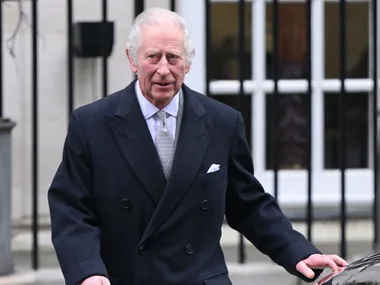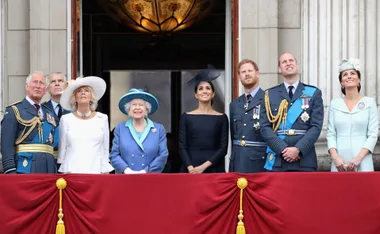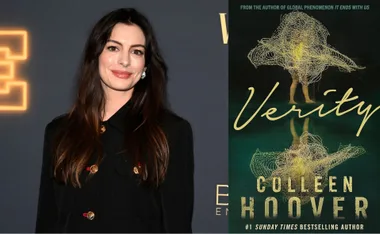Belinda Alexandra’s White Gardenia (HarperCollins), has been selected as the Great Read in the November issue of The Australian Women’s Weekly.(see page 303).
Her debut novel is based on the true life story of her Russian mother, who was forced to flee China at the outbreak of WWII and eventually made her way to Australia. It is a powerful and moving story of a mother and daughter torn apart by events beyond their control. Rich in incident and historic detail, it spans decades and continents, stretching from glamorous Shanghai to a tent city on a remote Pacific Island, and finally, Australia.
Q You must be pleased to be having your first book published?
A I’m thrilled, I pinch myself all the time.
Q How many publishers saw the manuscript?
A I already had an agent, Selwa Anthony, and when I gave her the manuscript she said ‘We’re taking this to auction’. So she sent it to about five publishers and they all loved it and bid against eachother for it. So that was very exciting and it felt very odd, like I was going from this person who hadn’t had anything published to having a lot of publishers interested in the book. It didn’t feel real. It was like it was happening to someone else.
They all wrote such lovely things about the novel. It was very touching and it meant a lot to me because I wrote the novel with an enormous amount of love. I think that seems to have given it some kind of magic.
The whole thing’s exciting.
When I was at university I did a Masters in Creative Writing and wrote a chick-lit novel, so completely different to White Gardenia. I think White Gardenia is really me and my voice, and I can develop on that. When I was at university, because I was a lot younger and it was very hip to be a writer, and to be seen as a writer, I wrote this novel and that’s how Selwa got interested in me. She said, ‘You can really write. Can you do something a bit more mature?’
Q How did you know Selwa?
A I saw her a couple of times and I thought, I really like her, she’s got something magic and a bit different about her. I first made contact by sending her a two line fax. When I left university I was doing some work for a small publishing company called Reed Books. They were publishing one of Selwa’s authors.
Q What did you set out to achieve when you wrote White Gardenia?
AI really set myself up. I didn’t write a contemporary novel set in Sydney 2002, which would have been a lot easier to do. But my inspiration was my mother and godmother, their friendship and the bond between them. That was the first idea I started with. They were two very young women who had made this incredible journey after having lost most of their family. And the fact that they’re now mothers and grandmothers, and they’re still very good friends. White Gardenia is not their story, it is completely fictional, but I was inspired by that and the family history.
At first you just grow up with it (family history) and you take it all for granted. As you get older and explore the world and you travel, you put yourself more in other people’s shoes. And I think I put myself in their shoes and thought ‘gosh’, they were the same age as me. And they had to leave everything. I can’t imagine if I’m sitting here talking to you and there’s a revolution, and we both have to put down everything and leave. It’s just not real fur us. That’s an idea of how incredible a thing it was to happen to my grandparents first and then for my mother, to have leave her birth country which was China. It started to fascinated me and I started to do a lot more reading in that area. And the novel started to come to life. It also had an incredible effect on my relationship with my mother. Because I always loved my mother but she always seemed so different and so apart from me. I couldn’t really understand her. I was brought up in Australia and we have the Australian culture, and there was just something very different about my mother. As I started to research the novel, I put myself in her shoes, what she’d been through and began to learn a lot more about Russian culture. I also travelled to Russia. I was in Moscow going, ‘Gosh, every second person is just like my mother.’.bAnd I think my mother saw me appreciating their story looking at what happened to them and being interested, and I think it made our bond very close.
Q It gave you more connections?
A Yes, absolutely. And it’s interesting, when I was doing my 1950s research in Sydney, I was speaking to a lot of my friend’s parents, who were teenagers in the ’50s, to get a feel for it and they were saying, ‘Oh, our children aren’t interested in what happened to us or our lives.’.And I think that I got a tremendous gift in that I did actually find out about my mother’s life and what she went through. To me, it’s tremendous because now I just love listening to people’s stories. I realise that listening to other people changes you as well. It gives you something.
Q Is that a meowing I hear in the background?
A I’ve got two little Burmese cats and they go, ‘Oh, she’s not paying attention’, so they make these distress calls and you think something’s terrible happened to them, and it’s only an attention seeking thing. They’re my little darlings. I’m on my own a lot writing, so it’s nice to have some company. They have something about the phone, they go, ‘Oh there she is, talking into that thing again.’ Gardenia and Lilac are their names and they were my reward for the book, my special gift to myself.
Q You actually wrote parts of White Gardenia with two cats, one either side, when you were living in New York?
A Yes, I did. In the second novel I’m writing cats have a big part, so…they’re my little soul companions. My little spirit animals.
Q What were you doing living in New York?
A I didn’t go to NY to write the book, but it turned out to be such a good situation for me because it got me away from everything that I was familiar with. So I could really get this story out, especially the parts where I had to imagine Sydney, because I was removed from it. I loved NY, but I had moments of walking down the street on a freezing NY winter’s day and I suddenly remembered the sun of Australia. And it was like I was seeing it through fresh eyes.
I was in NY for a job, but I was writing the book at the same time. I worked for a conference company so I did a lot of travel. We always imagine writers have these quiet little garrets they go to, but I shared my first apartment, where I started writing the book, with two Scottish girls and two English girls, and I had a little room that came off the kitchen. So I was trying to write with cooking sounds coming from the kitchen, and the telephone was right outside my door as well – can you imagine with like four other girls and a telephone? And it was freezing cold and I’d be sitting in a coat and a balaclava, fingerless gloves. Snow would blow in my window off the Hudson. And the worse thing about it was my characters were coming out with Scottish accents. I had to keep going though, or this book was never going to get written. And I was never going to have, at that point in my life, a good writing situation, so my choice was either not to write or write in a bad situation and what happened was that you adapt. Just like people go blind and their hearing gets better, when writers have dreadful conditions they focus better. I learned to write on planes and in airports, and in hotel rooms – but you can do it as long as you’re really interested in what you’re writing about. You’ll come back to it and if you don’t feel that way, then maybe it’s not the right story for you to be writing. If you’re time-poor you really need to make sure you’re doing what you’re most passionate about and interested in.
Q What exactly was your job?
A I wish I knew. Mainly assist my boss who was a conference producer. And so I would have to call people and ask them to be speakers and at the conference look after the speaker, make sure they had all the equipment and that they were happy, and liase with the people who came to the conference. It was a completely different area for a writer to be in because it was finance people and you had to learn to make conversation about high finance. They ask what you do and you’d say you’re writing a book and they’d look at you like you were an alien.
Q Where did you do the Masters?
A At UTS, the University of Technology in Sydney. After I finished my chick-lit book, I started to do the research for White Gardenia. And I more or less wrote the first draft for my thesis. But when I was on the plane to NY, I re-read the manuscript and I thought this doesn’t work, I’ll have to start all over again. So I thought either I start all over again with this book, or I start a new book. I said, ‘No, I’m going to start this again. So I started writing the first chapter again on the plane. As soon as I made that step I knew I was serious about writing. It wasn’t just I need to write a book and I need to get published. It was really like I have a story to tell and I have to think about the quality of what I’m doing. It was almost like a spiritual thing, like you’re honouring the creative force or your ancestors by doing your very best, and you don’t worry about the success or outcome or whether everyone thinks you’ve failed. Or what your friends think and that was a huge journey in maturity.
I felt like this character Anya, who not only makes this journey but tells her story. Somehow I went with her on this journey too, but on a different road, different life.
Q A major theme was the mother/daughter relationship and the strength of it, despite being separated for a long time?
A Yes, because of the separation they didn’t really go through all that mother/daughter emotional stuff and the rebellion. They had a very close pre-adolescence relationship and then were together as women who’ve been through a lot and then found each other. I don’t think the story was ever planned because when I started the story it was going to be about Anya’s friendship with Irina. But it changed and it really did become about the mother and the daughter and their longing. It’s a love story, but not a love story between a man and a woman, it’s about a longing between a mother and her daughter.
Q Perhaps shaped by your own emotional distance from your mother?
A Yes, that’s definitely a possibility. Not really being able to understand her or the mystery of her, and then being able to solve the mystery at the end when I’m a bit more experienced, but able to understand more and not just be totally me, me, me and life is only about me. To be able to look at what happened to her and learn something from that. Or develop another layer to me. I hadn’t thought about it till you mentioned it, except that it is an interesting novel because there is so much longing in it and because people are responding to it so well, especially women. I think it is something we identify with and perhaps don’t think about much.
I realise too the incredible power of that relationship with your mother and yet I have a couple of friends that lost their mothers when they were young and it’s really like being cut adrift. They have become very independent and strong in themselves, but I think they always feel that loss. They lost their mothers before their teenage years so that they had to be mothers to themselves. When you have friends who have lost parents later in life, it’s a huge step in our life at that point. So I guess that’s why people are touched by my novel, they feel tremendous bonds with their mother and I guess they are always longing for it.
Q Where did get the name White Gardenia from?
A There were a couple of references to gardenias in the novel because my mother has always loved gardenias and I associate them with her. That just came into the novel, but I had originally called it after the Russian dolls. Because I thought of the layers of that story, but they thought it was too Russian a name. My agent and I talked about it. Her mother had very close connections with gardenias as well. And at the time, Selwa’s whole garden was alive with gardenias. So she said let’s call it White Gardenia and I said, yes, that’s it. And it just worked, it clicked into place because it is a very feminine image, for that age and that time. Also we came up with that idea that they bruise very easily if you squeeze too hard and we thought that was a good image for the main character – that she’s strong but she bruises as well.
Q You were also inspired by the fact that, despite the dreadful things that had happened to your mother and godmother, they have a great love for life and a great capacity for love?
A Yes, you see it in Anya. People do rotten things to her and she does suffer for it, and she does have to emotionally deal with it, like Dimitri, she really has to process that terrible hurt attached to him but it doesn’t stop her from moving mentally on to love someone else. And that’s her growth and her process of being able to love despite the pain and that pain and happiness for her are always together. Like she starts with the loss of her father, but she still has her mother with her and all through her life she has good people with her. Everyone says they cry when they get to the end. I think it’s a real life story, isn’t it, because we can read about all these fabulous people leading fabulous lives and everything seems happy, but the truth is, every human being knows pain. And when we embrace that then we can really experience joy at the same time.
Q I loved the Japanese general character – was he a product of your imagination?
A Yes and no. That mysterious male figure that we have somewhere in our lives that comes and saves us and then goes on his way. My mother did have a general move into her house in Harbin (China). But it was a different situation because she left before the war. When she tells the story about him it’s very funny because he did say to her, ‘I have a daughter at home who doesn’t have a father so I must take care of you’. I think he was an inspiration to the story. Because in a war there are so many atrocities, and yet you’ll hear about one German, like Schindler’s list, who opposed it or who doesn’t have that cruelty and I think the general was like that because the Japanese cruelty was unbelievable in China. And yet he’s one individual you get to see inside and he’s still a human being caught up in this madness. In the end my general took on his own personality and his own role in Anya’s life.
Q I believe your mother had your grandparents wedding rings melted into one and you wore it while you were writing the book – did you feel it helped you?
A Yes, because I’ve never met my Russian grandparents, my grandfather died in China and my grandmother made it to Australia with my mother but died soon after from all the stress. And I never got to meet her, but I’ve often felt quite close to her in that apparently she was a person who now matter how bad things got, she could still keep her sense of humour and I feel that there is an element around me, where a funny side does come out of dreadful situations, so I’ve always felt quite close to her. When I say I wrote the story with love, it was because Anya and those characters really had a story to tell and I almost kind of channelled that and put my ego aside and really wanted to tell a wonderful story and do the very best I could with my skills and I think by focusing on my ancestors, it was a way of honouring them. And saying let me use whatever time I’ve got to tell a tremendous story. So I wore the ring to help create the atmosphere.
Q Did you have to get your mother and godmother to sit down and re-trace their footsteps in much more detail than you’d ever asked of them before?
A Yes and it was very difficult because it was their emotional life and because I’m connected to them, they were very hard interviews to do. Because these stories are incredibly painful and things they saw as young women and children were things I can’t imagine, like massacres of people, executions and things that happened to their family members that were so dreadful. I was even surprised because I think as a child they protected me, they didn’t tell me all the stories. As we were talking, stories came out that had been a mystery to me as a child. What happened to that person? Why don’t we ever talk about that person? I didn’t know I had a step-grandfather. He had suffered with the Japanese as well, but it was just too painful to talk about, so I discovered whole dimensions to my family. They weren’t easy interviews, but they were definitely insightful. And because my grandmother is a very gregarious character, she introduced me to other Russians who were able to tell me their stories as well.
Q Do you speak Russian?
A A little. I started learning again when I started working on this book. When I was little, my mother would speak to me in Russian but the sad thing was it was a different time. To speak another language is no problem now, but when I was little, it was something everyone was very self conscious about, especially Russians because of the whole Cold War thing. My mother was self conscious of having a Russian accent.
It’s sad, but it’s also not a bad thing that I had to work to reach my roots. It shows that I appreciate it. And that I’m willing to do it. I think we carry a lot in us genetically in terms of memory and ability. Russian comes to me more naturally than Japanese, even though I’ve spent hours at the university studying Japanese. Russian is a part of me.
Q You were born and raised in Sydney and attended which school?
A Yes, in Turramurra (Sydney), and I went to the local high school.
Q Where did you attend university?
A I started off at Sydney University and then I got to go on exchange to the University of California, about an hour south of LA and right near Newport Beach. So it was very good – they were my Melrose Place years. That was around 1994- 1995.
Q How old are you?
A Oh, I never say my age because I have this theory that when I’m 70 I will want to lie about it. Also, I never ask people because if you do, you categorise them.
Q At The AWW we take the opposite view, the more women are open about their age, the less it will be a stigma.
A I appreciate that, but you still won’t get it out of me. Sometimes I waver, I think yes, I agree with that. Then other times I think it’s always obvious what race and sex you are, but it’s not always obvious how old you are, so.
Q Well, you’ll have to at least say 20-something or 30-something.
A Okay, you can call me a youngish 30-something.
Q Star sign?
A Capricorn.
Q Belinda loves?
A Paris, perfume and beautiful cats.
Q Belinda believes?
A Everyone’s got a good story to tell.
Q I was going to ask you about the hours you write, but with White Gardenia, you wrote whenever you could squeeze it in?
A Yes, because I was writing so erratically, I kept a little notebook and wrote down in shorthand what I had achieved that day because when you’re writing in bits and pieces, you think, oh my God, I haven’t achieved anything and by doing that I noticed that I had! And I was finding time to write which was encouraging. But now I definitely have a routine because I’m a full-time writer – that’s what I do. And I found out that because I was used to doing it whenever I had a chance, I was working ruinously long hours. I’d feel guilty if I stopped because I felt I’d never know when I’d get a chance again. And I started to burn myself out a bit. And Selwa and my publisher both said, ‘No, you’ve got to approach it more like a job and have regular hours’. I’ve been trying to do that, so I start about nine. I still get up very early and do some yoga or dance practice. And have a good breakfast. And then take the cats for a walk and then settle down to write.
Q Take the cats for a walk?
A Yes, they’re indoor cats and we have a lot of birds in Turramurra, so I have to walk them on a lead. I’m the neighbourhood eccentric. They love it, they know their time, they sit at the door and wait.
Q You must have got them when they were kittens, to get them used to it.
A Yes, I think they think they’re little puppies.
Q How long do you write for once you’ve started?
A Usually around three hours at a stretch, but sometimes when I’m really into what I’m doing I keep going, say for six hours straight. But that’s when I’m really under pressure to get a new chapter to my publisher or something like that.
Q Have you a contract for your next book?
A Yes, I got a two book deal, so I can write full-time on the next one which is very good.
Q What genre is your next book?
A Also a sweeping historical saga, set in France in the 1920s.
Q Why then?
A I always had a fascination for that period. Because that was just after WWI and people had seen this devastating war, and so many writers and artists and musicians and painters were living for the moment and creating for the moment. I’ve always been fascinated by the lifestyles of Picasso, Anna Pavlova, everyone was in Paris in the 1920s. Scott Fitzgerald and his wife Zelda. Hemingway. It was just such a vibrant, interesting period that if I could have been a writer any time I would have loved to be one in the 1920s. Now I can just live it voyeuristically.
Q And cats figure in it?
0A Yes and I just made a research trip to France, spent some time in Paris and there are people walking their cats on leads there as well, so I am not totally alone. I think it’s interesting. Pets and Parisians go well together. So I think cats will be interesting characters in the book.
Q And you’re studying French and jazz ballet?
A Yes. This book will be in first person as well, so almost like an actor preparing herself for a part, I like to get myself into character to tell the story of this person. So I am doing all sorts of things that are not really me. I’m doing acting classes. And I will probably do some tap dancing classes as well. People say write what you know, but I enjoy getting into another personality for a book. It’s almost like getting into a role and another time.
Q When you wrote Anya, did you go into character?
A Yes, when I put on my grandparent’s wedding ring, I think this Russian character and her Russian way of thinking, came to me. And her view of the world and the way she would think started to come to me. I would think, how would Anya do this or what would Anya think of this? And I think especially in Australia, when I was researching the 1950s I started to get a bit of a 1950s look.
And I think now I’m starting to get a bit of a 1920s Parisienne look (laughing), I can’t help it.
Q Did you ever take on a Russian ‘look’?
A When I was in Paris, people would ask where I was from and I would say Australia, but people would say you’ve got to be Russian. The interesting thing about that is that I don’t look like my mother, I look like my father who is Australian.
1










